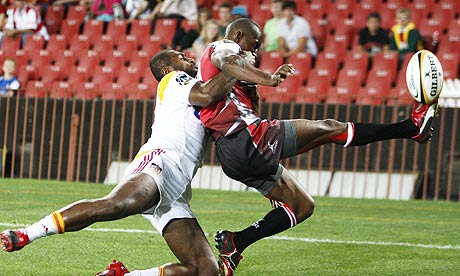
Forgive the obsession if that's what it is but, if you had spent much of the past two years coaching players how to deal with high balls or stay within the law, as currently applied, at the tackle area, you'd also be happy at what appears to be a chink of light in the gloom.
Look at the team-sheets for this weekend's internationals in Cardiff and London and you'll see a couple of South African names – Jonathan Kaplan, who is refereeing our game tonight in Cardiff against France, and Mark Lawrence, who is looking after England versus Ireland at Twickenham tomorrow.
Both are experienced referees – Kaplan has 55 Tests behind him, including six involving Wales, and Lawrence has 21, five of them with England – but their particular relevance this weekend is the attitude they bring with them. If everything goes well, we might be in at the start one of those sea changes in the way rugby is played – and a change for the better at that.
After seven years of talking and a couple of seasons messing around with experimental laws and interpretations, or edicts involving those laws, the southern hemisphere is now a couple of weeks into the Super Rugby season operating with rules that are designed to benefit attack rather than defence and it seems to be working.
I know there are those who will throw up their hands in horror at the mere mention of Super 14 and will lampoon the southern hemisphere, especially when it produces results like last weekend's 72-65 scoreline between the Chiefs and the Lions at Johannesburg. Well, write that one off as a joke, an aberration – rubbish rugby played by two teams who didn't tackle, rubbish at altitude.
Instead take a closer look at some of the other games with less extravagant scorelines and the way the tackle area is being refereed is quite refreshing; the tackler clearly having to release his grip on player and ball and be on his feet before he goes back for the ball. Allister Coetzee, head coach of the Stormers, has his players clap their hands in front of the referee to demonstrate the clear pause between tackle and attempted turnover.
As I say, all bar those who don't want to see it will detect the potential for an improvement on the interpretation which allows the "first tackler" the same rights as the ball carrier at the breakdown – part of the switch from the ambition with which rugby was played two years ago to the caution of the current game and its reliance on safety-first kicking.
It takes time to change entrenched attitudes but, speaking to some of the more influential characters in the world of referees, I sense a groundswell of confidence that things are about to change and might be about to get a push in the right direction from two of the better officials in the world game. It will be interesting to see how England respond.
Martin Johnson has taken a bit of a battering since Rome but has made the right decision in putting out an unchanged team to face Ireland. Since 2003 it's been rare to see such continuity and an understanding of the confidence it gives a side is often lost on those demanding change.
Rome wasn't pretty but then again Italy didn't intend to make life easy for England and are rather good around those areas – the line-out, scrum and breakdown – that dictate the tempo at which a game is played. Ask Ireland about Paris a fortnight ago. Last season's grand slam champions arrive at Twickenham having suffered a few bumps and bruises to body and mind.
The French were pretty formidable and while the half-backs, François Trinh-Duc and Morgan Parra, or backs such as Clément Poitrenau and Mathieu Bastareaud, left, get singled out for praise, it is up front where everything starts. It was the physicality of the front-five forwards and mobility and tenacity of the back row that undid Ireland and it will be fascinating to see how they cope with that rarest of experiences under Declan Kidney – a defeat.
A confident England versus an apprehensive Ireland suggests a tight game. I see England taking another step towards a first Triple Crown since they were world champions and the game seemed a lot simpler. That was back in 2003 when those responsible for the whole cycle of tinkering with the laws of the game had barely put their heads together.

